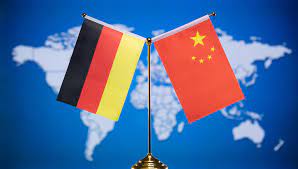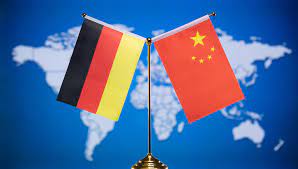
In an effort to lessen its reliance on Asia's economic superpower, the German economy ministry is considering a number of measures to make doing business with China less appealing, according to two people familiar with the situation who spoke to Reuters.
According to those people, the measures could include lowering or even eliminating the investment and export guarantees for China and ceasing to support trade shows and manager training there. To diversify trade and expand business with democracies, loans from the state-owned lender KfW may be redirected to initiatives in other Asian nations, such as Indonesia.
One of the sources told Reuters that the ministry is also thinking about screening German investments abroad, in addition to Chinese investments in Germany.
Along with the Group of Seven wealthy democracies, the government is also reportedly considering complaining to the World Trade Organization about what it sees as unfair Chinese trade practices.
“We should show Beijing that we are willing to fight for the principles of fairness,” the source said.
However, the ministry was looking into targeted measures "to support the diversification (of trade and supply chains) and the strengthening of resilience," according to a spokesperson for the economy ministry, who declined to comment on these specific measures.
Given worries about human rights violations there and a lack of trustworthy information, the ministry had already decided to stop providing investment guarantees for projects in the Xinjiang region or to businesses there that have business relations.
Volkswagen's requests for new investments in China were rejected by the economy ministry in May due to worries about Xinjiang.
There were no comments available on the issue from the Chinese foreign ministry.
The plans represent a change from Berlin's policies under former Chancellor Angela Merkel, who led a boom in German-Chinese economic ties and led large business delegations on her frequent trips to China.
With a trade volume of over 245 billion euros in 2015, China surpassed the United States as Germany's top trading partner, contributing to the expansion of the continent's largest export-driven economy.
Volkswagen generates about half of its profits in China, which puts German automakers at particular risk. China is a major supplier of raw materials to Europe and Germany, including rare earths.
In reaction to Beijing's tightening control over the society and economy under President Xi Jinping, German politicians and business leaders have already pushed for greater diversifying in trade with Asia.
Merkel acknowledged she might have been naive at first in some areas of cooperation with China shortly before leaving office last year, according to Reuters.
In its coalition agreement, the new government committed to taking a tougher stance toward China, promising to lessen its reliance on this "systemic rival" and mentioning issues that are delicate for Beijing, such as Taiwan and Hong Kong, for the first time. In contrast to Merkel, Chancellor Olaf Scholz visited Japan for the first time in Asia.
Berlin is preparing a national security strategy that will mention China as well as a China-specific strategy that it plans to release next year, according to the sources.
The Greens junior coalition party, which controls the ministries of the economy and foreign affairs, says it is especially concerned about violations of human rights and the dangers of being obligated to an authoritarian state that is becoming more assertive, as is the case with Russia.
"We cannot ... afford to just behave following the motto 'business first', without taking into account the long-term risks and dependencies," Foreign Minister Annalena Baerbock told the annual congress of ambassadors this week.
"In reality we never received cheap gas from Russia," she said. "We paid twice or three times as much for every cubic meter of Russian gas in our national security."
According to sources, Scholz's Social Democrats are less likely to upset the apple cart. Scholz expressed confidence that businesses are already diversifying and cautioned against any "decoupling" from China.
Businesses and corporate associations are speaking out more about their concerns about a tougher China policy, arguing that trade diversification is more important than taking confrontational action in such a crucial market.
"We cannot isolate China," said Hildegard Mueller, the head of the German autos association VDA, told digital outlet Table Media. "That would be naive – and fatal, both politically and economically.
(Source:www.reuters.com)
According to those people, the measures could include lowering or even eliminating the investment and export guarantees for China and ceasing to support trade shows and manager training there. To diversify trade and expand business with democracies, loans from the state-owned lender KfW may be redirected to initiatives in other Asian nations, such as Indonesia.
One of the sources told Reuters that the ministry is also thinking about screening German investments abroad, in addition to Chinese investments in Germany.
Along with the Group of Seven wealthy democracies, the government is also reportedly considering complaining to the World Trade Organization about what it sees as unfair Chinese trade practices.
“We should show Beijing that we are willing to fight for the principles of fairness,” the source said.
However, the ministry was looking into targeted measures "to support the diversification (of trade and supply chains) and the strengthening of resilience," according to a spokesperson for the economy ministry, who declined to comment on these specific measures.
Given worries about human rights violations there and a lack of trustworthy information, the ministry had already decided to stop providing investment guarantees for projects in the Xinjiang region or to businesses there that have business relations.
Volkswagen's requests for new investments in China were rejected by the economy ministry in May due to worries about Xinjiang.
There were no comments available on the issue from the Chinese foreign ministry.
The plans represent a change from Berlin's policies under former Chancellor Angela Merkel, who led a boom in German-Chinese economic ties and led large business delegations on her frequent trips to China.
With a trade volume of over 245 billion euros in 2015, China surpassed the United States as Germany's top trading partner, contributing to the expansion of the continent's largest export-driven economy.
Volkswagen generates about half of its profits in China, which puts German automakers at particular risk. China is a major supplier of raw materials to Europe and Germany, including rare earths.
In reaction to Beijing's tightening control over the society and economy under President Xi Jinping, German politicians and business leaders have already pushed for greater diversifying in trade with Asia.
Merkel acknowledged she might have been naive at first in some areas of cooperation with China shortly before leaving office last year, according to Reuters.
In its coalition agreement, the new government committed to taking a tougher stance toward China, promising to lessen its reliance on this "systemic rival" and mentioning issues that are delicate for Beijing, such as Taiwan and Hong Kong, for the first time. In contrast to Merkel, Chancellor Olaf Scholz visited Japan for the first time in Asia.
Berlin is preparing a national security strategy that will mention China as well as a China-specific strategy that it plans to release next year, according to the sources.
The Greens junior coalition party, which controls the ministries of the economy and foreign affairs, says it is especially concerned about violations of human rights and the dangers of being obligated to an authoritarian state that is becoming more assertive, as is the case with Russia.
"We cannot ... afford to just behave following the motto 'business first', without taking into account the long-term risks and dependencies," Foreign Minister Annalena Baerbock told the annual congress of ambassadors this week.
"In reality we never received cheap gas from Russia," she said. "We paid twice or three times as much for every cubic meter of Russian gas in our national security."
According to sources, Scholz's Social Democrats are less likely to upset the apple cart. Scholz expressed confidence that businesses are already diversifying and cautioned against any "decoupling" from China.
Businesses and corporate associations are speaking out more about their concerns about a tougher China policy, arguing that trade diversification is more important than taking confrontational action in such a crucial market.
"We cannot isolate China," said Hildegard Mueller, the head of the German autos association VDA, told digital outlet Table Media. "That would be naive – and fatal, both politically and economically.
(Source:www.reuters.com)





